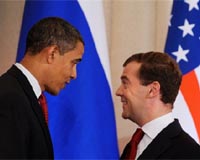| . |  |
. |
L'Aquila, Italy (AFP) July 10, 2009 The G8's days as the world's top economic policy forum appeared numbered on Friday as leaders, including US President Barack Obama, endorsed moves towards a more inclusive system. The eight big industrialised democracies still plan to meet in a year's time in the wild Canadian region of Muskoka, 90 minutes outside Toronto, but by then the grouping could well have taken a back seat to other bodies. Leaders of the G5 -- emerging economic giants Brazil, China, India, Mexico and South Africa -- are pushing to be involved in the big global decisions and the heads of the Group of Eight are increasingly seeking their help. "I think we're in a transition period. We're trying to find the right shape that combines the efficiency and capacity for action with inclusiveness," Obama told a news conference on the final day of the G8 summit in Italy. "And my expectation is that over the next several years you'll see an evolution and we'll be able to find the right combination. The one thing I will be looking forward to is fewer summit meetings." That will be music to the ears of leaders like Brazil's President Luiz Inacio Lula da Silva, who has been lobbying hard for G5 inclusion at the top table. In L'Aquila this week the G5 were invited along, as was Egypt, and held a meeting of what was thus the G14. Then -- with Australia, South Korea and Turkey -- everyone met once again as the Major Economies Forum. But the key decisions on global warming, protectionism and trade talks were made on day one within the narrow G8 group: Britain, Canada, France, Germany, Japan, Russia and the United States. All that will change at the end of September in Pittsburgh, when Obama will host a G20 meeting of all the major world economies -- developed and emerging -- to address the key issues of the global financial crisis. Some think things should always be that way. "I don't know how you can convince a country with a billion people like India to fight against climate change if you only invite them to the end of a summit to settle the bill," France's President Nicolas Sarkozy said. Some leaders, however, are concerned that if too many voices end up around the table, decision making will become impossible, and the annual summits will drag on without anything getting done. Japan, which opposed Russia joining the G7 to create the G8 a dozen years ago, has been the group's main champion, and Prime Minister Taro Aso warned on the last day of the latest summit that it still plays a vital role. "It's true that the G8 alone will not be able to resolve all the problems in the world that need resolution," Aso told reporters. "At the time of the economic and financial crisis that started last year we need the contribution of India, China and Brazil," he conceded, while insisting that the G8 still had a leadership role to play. "It's precisely because we need today in the world to address probably a greater number of countries that I think that the importance of the G8 is increasing," he argued. Sweden's Prime Minister Frederik Reinfeldt, who represented the presidency of the European Union in L'Aquila, shared his concerns. "In the G8 we were only 10 at the table," he said. "To be very open, those were the best discussions because those were real discussions.... Many more leaders have come for the meetings, but those tend to be statements." And, even if the G8 were to expand, how many more countries would qualify? "One point I did make in the meeting is that what I've noticed is that everybody wants the smallest possible group, smallest possible organisation, that includes them," Obama said. "So if they're the 21st largest nation in the world, then they want the G21, and think it's highly unfair if they've been cut out." The G8 will therefore probably continue to exist -- and summit agendas will still ressemble lists of mathematical formulae with meetings of groups like the "G8 + G5 + 1" -- even if in future its role begins to diminish. "I think increasingly a lot of the discussions will be in the wider economic context of the G20," said Britain's Prime Minister Gordon Brown. "Also in the context of the G14 there will be a number of security and other issues. But I believe that the Canadians will call the G8 meeting next year and that the French will follow the year after," he added. Share This Article With Planet Earth
Related Links Learn about the Superpowers of the 21st Century at SpaceWar.com Learn about nuclear weapons doctrine and defense at SpaceWar.com
 Outside View: Obama's bold game
Outside View: Obama's bold gameManipal, India (UPI) Jul 7, 2009 With the same confidence that allowed the junior senator from Illinois to launch a campaign for the presidency of the United States, Barack Obama has decided to "reset" U.S.-Russian relations, banking on the forward-looking vision he shares with Russian President Dimitry Medvedev. For the U.S. president this has been a high-risk operation, given the undercurrent of suspicion toward ... read more |
|
| The content herein, unless otherwise known to be public domain, are Copyright 1995-2009 - SpaceDaily. AFP and UPI Wire Stories are copyright Agence France-Presse and United Press International. ESA Portal Reports are copyright European Space Agency. All NASA sourced material is public domain. Additional copyrights may apply in whole or part to other bona fide parties. Advertising does not imply endorsement,agreement or approval of any opinions, statements or information provided by SpaceDaily on any Web page published or hosted by SpaceDaily. Privacy Statement |